A tall, gaunt man limped toward me as I dragged my luggage down the steps of the train that had just arrived in Sofia.
“Where are you going?” he asked shyly, bowing his head in deference.
He wanted to ‘guide’ me in return for a fee but I was fairly certain I could find my way, so I waved him off with a smile. Inside the station I exchanged my few remaining Romanian leu for Bulgarian lev, hit the ATM for additional money, then stepped outside and looked around for the tram or the Metro. Finding neither, I returned to the station, searching for an information booth.
He was waiting for me. “Can I help?” he asked.
Tired from a long train ride, I capitulated and allowed him to lead me to the tram station a block away, where he learned that line was under repair and not in service. “You take taxi,” he suggested. Immediately, my radar kicked in. Was this some sort of a scam?
“No, I take Metro.”
Beckoning me to follow, he limped across the street and descended a stairway leading to an underground tunnel. Growing more suspicious, I followed cautiously, wrinkling my nose up at the stench of urine. “Maybe I’ve made a mistake scheduling a week here,” I thought. At the end of the reeking, litter-strewn tunnel he again motioned for me to follow through double glass doors into the Metro office. After helping me buy a ticket and pointing out my destination on the map, he stepped aside, asking for nothing. Gratefully, I gave him a few lev for his time and proceeded through the turnstile, into a sleek, brand new, spotless Metro station.
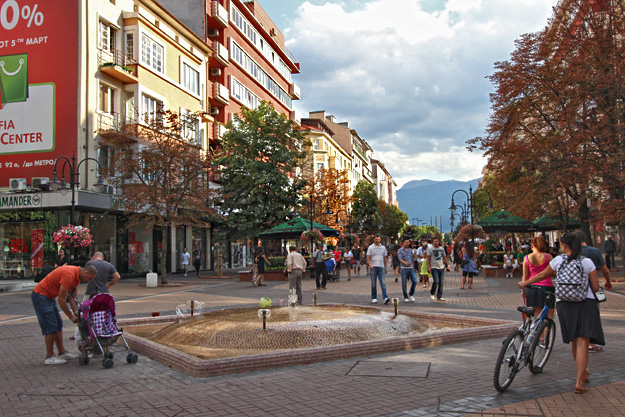
Moments later I boarded a train for a quick trip to NDK station, where I emerged onto Vitosha Street and stopped dead in my tracks. The wide pedestrian boulevard was filled with people out for a stroll or enjoying lunch at curbside cafes. Children played in fountains and a crowd had gathered around break-dancing street performers. Luxuriant baskets of flowers hung from every street lamp, bursting with color in the bright afternoon sunlight. “Maybe a week in Sofia won’t be long enough,” I mused.
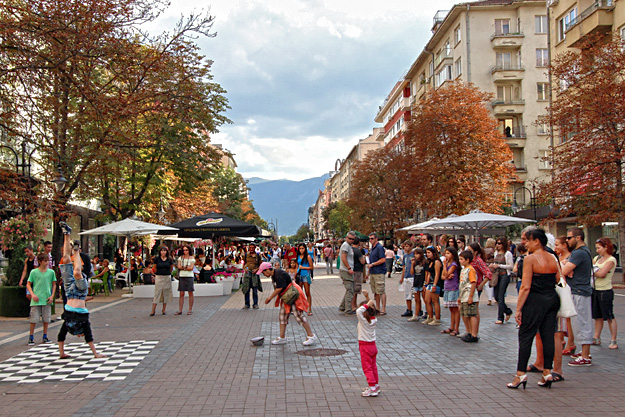
Having just come from sterile, impersonal Bucharest, Romania, I expected more of the same from this neighboring country but my first impression of Sofia was only a harbinger of things to come. The owner of the Canape Connection Hostel welcomed me warmly, handed me a map of the city, and gave me a brief orientation that included directions to nearby vegetarian restaurants. Later that evening he asked if I would mind checking in a late arrival, as the owners depart at 10 p.m. each night. I had been in Sofia for less than 12 hours and suddenly I was in charge of a hostel!
For the next seven days I reveled in all that this attractive capital city offered. Though I had thoroughly enjoyed my time in Hungary and Romania, meals had been difficult, as they consisted mostly of carb-laden dishes heavy on meat, bread, and potatoes. Vegetarian selections were invariably some sort of fried cheese. On my first foray into the cuisine of Bulgaria I was pleasantly surprised to find an array of salads on the menu, including a ‘stacked’ salad with alternating layers of fresh bibb lettuce, thick tomato slices, grilled vegetables, and haloumi cheese, all drizzled in a delicious vinegar dressing and garnished with garlic rounds. I swooned when I bit into the tomato. Unlike the tasteless varieties found in supermarkets across the U.S., this was rich and juicy and bursting with a flavor that reminded me of my childhood, when my sisters and I carried salt shakers into my grandfather’s garden, picked enormous beefsteak tomatoes, and ate them on the spot, red juice dribbling down our chins.
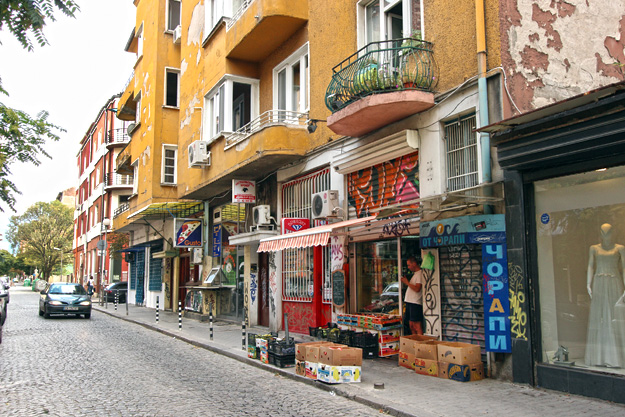
A highlight of my visit was the free Sofia Walking Tour, an English-language sightseeing tour conducted by in-the-know volunteers. We set off from the Palace of Justice promptly at 11 a.m. and two hours later I had seen all the major landmarks. Along the way our guide wove fascinating historical details into his narrative, including the story of how Bulgaria saved its 48,000 Jews from being deported to concentration camps during World War II. Bulgaria agreed to support Adolf Hitler because the country had limited military resources; resistance would have been futile. But when Hitler demanded that Bulgaria turn over its Jews there was a huge public outcry, led by clergy from the churches. The King of Bulgaria devised a plan to foil Hitler. Each time he demanded the Jews, the King promised to deliver them, but not until they had completed construction of a new highway, government building, or bridge. In the end, he stalled so long that every single Jewish resident of Bulgaria survived the war, a fact of which the country is rightly proud. Today, Catholic, Islamic, Jewish, and Eastern Orthodox churches face one another in the city center, a reminder that people of different faiths can live together in peace and harmony.
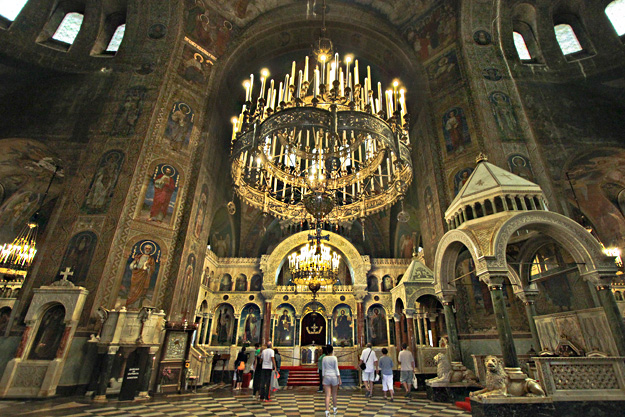
Over the next few days I returned to many of the sites on my own. At Ivan Vasov Garden, one of the city’s most popular meeting places, I listened to a Bulgarian band play New Orleans jazz and watched in fascination as a man in a maroon suit jacket and herringbone checked fedora set up a chess board on a portable table and sat down to wait patiently for a contender to appear.
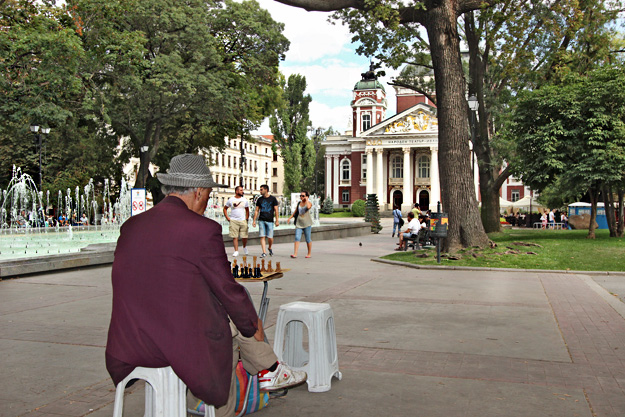
I examined the ruins of an ancient Thracian city, precursors of Bulgarians, and filled my water jug at the mineral fountains fed by hot springs beneath the city. Those same springs had for years been the source for the Central Mineral Baths, where elite and commoners alike gathered to take the waters. Though the baths are no longer active, the gorgeous Vienna Secessionist style building, which incorporates Byzantine and Eastern Orthodox elements, is currently being restored for use as a museum.
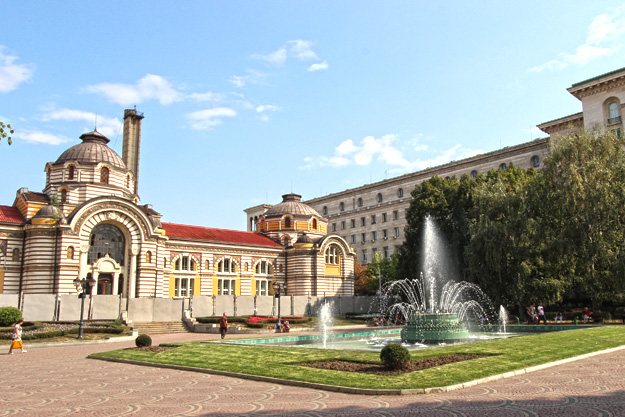
One afternoon I discovered the Tea House on Benkovski Street, which hosts live music performances and poetry readings. I sank into an overstuffed armchair and rested my aching feet as I sipped Earl Grey. The bulletin board at the door overflowed with notices of apartments for rent, dog walking services, and Yoga classes. This was definitely a city I could live in.
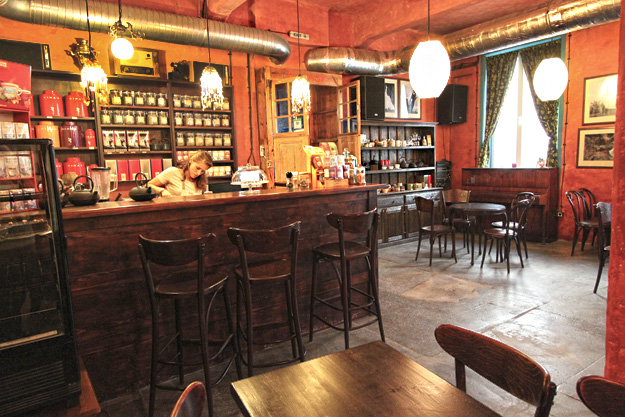
I thought my attraction to Sofia would wane, as so often happens, but the opposite occurred. I grew so enamored that I checked into the price of apartments and learned that a fully furnished, one bedroom apartment in the city center could be rented for $300 per month. Is Sofia destined to be my summer place? Perhaps, though there are so many places I haven’t yet seen. Only time will tell. I plan to continue my European tour next summer but for now, Sofia remains the most delightful surprise of Eastern Europe.
Check prices for accommodations in Sofia at Booking.com, Hotels.com, or HotelsCombined.com. Read reviews about hotels and guest houses in Sofia, Bulgaria at TripAdvisor.
Disclosure: This article contains affiliate links to hotel booking sites. If you click on any of the links and make a booking, I may earn a small commission, which keeps this blog free to read.

Im glad you liked the city. However, if you’d like to see real beauty, Plovdiv is the city in Bulgaria that is known for its beautiful artful appearance. A mere 140 km away from sofia!
Hi Omar: I had planned to visit Plovdiv but had to cancel because I wasn’t feeling well. It was a disappointment to me, because I’d heard it was such a fantastic city, but my health took priority. I did, however, make it to Rila Monastery and Sozopol, which you can read about in these two stories:
https://holeinthedonut.com/2013/12/26/rila-monastery-bulgaria/
https://holeinthedonut.com/2014/01/05/what-to-do-in-sozopol-bulgaria/
Dear Barbara,
Age lived abroad and when I meet people who visited Bulgaria, asked me the same question: Why did I leave my beautiful country. I returned two years ago and now I can better assess its true qualities. It is a land inhabited 6400 BC and we act flows of these ancient people. Glad you are fascinated by Sofia, but this is a small part that you have disclosed. There are many misterious and ancient artifacts on our lands left by the Thracians and the people before them. Because little is known about Bulgaria, especially on the other side of the Ocean, and even in Europ, for those who are interesting, become my friend on Facebook and you`ll find a page from a misterious rich histori of people and places. So the next time you get here, forget about subways smell and urine. For which I am very sorry! Pavlo Pavloff
Hi Pavlo: I would love to friend you on Facebook; please send me your url. I also visited Sozopol and Rila Monastery and look forward to a return visit to see more of your lovely country.
Hi Barbara, I like your story about my city. I’m happy you love it and I really hope to have the opportunity to fall in love with the other part of Bulgaria. I want to show you some short movies about the history of Sofia.
I think they will help you to tell easily the story of your trip in Sofia. https://www.youtube.com/5minutessofia
Hi Millen: Thanks so much for the YouTube link. I’ll be sure to check it out. I definitely want to explore more of Bulgaria.
Dear Barbara! It was wonderful to read your article! Reminded me once more about the enchanting character of Sofia. 🙂 I love my city, my home. Next time you are in BG, you should totally consider making a trip around the country, or at least go to some places (mountains, villages where you can taste the home made products, the sea, etc.). I’m sure you’ll love it.
Take care and hopefully – see you around here some day! 🙂
Hi Denny: I’ll definitely be back some day. I did get to visit Rila Monastery, Burgas, and Sozopol, so I’ve seen a bit more of Bulgaria, but I’m anxious to see the mountain villages, as you say.
Thank you for the kind words, Barbara! As a Bulgarian, I am always delighted to read that a foreigner has appreciated our cultural heritage, you are more than welcome to come again in the summer, you can also visit my natal city- Plovdiv, the second biggest in Bulgaria and enjoy its old part with the Roman Theater, which originally belonged to the Roman Empire, and don’t forget our coastline which will offer you great beaches at very affordable prices :))
Hi Vera: Plovdiv is definitely on my list for my next visit. Fortunately, I did see more of Bulgaria than just Sofia, which you can read about in these stories:
https://holeinthedonut.com/2013/12/26/rila-monastery-bulgaria/
https://holeinthedonut.com/2014/01/05/what-to-do-in-sozopol-bulgaria/
Hello Barbara,
I was born and lived 20 years in Sofia. It is my hometown and I love it, but I have always thought it needs to improve in so many aspects as probably you have seen also. However, I am happy that I keep on meeting people that have a nice impression of my city. I just want to add to your article and the comments that Sofia is the 12th biggest capital in the European Union and the third oldest one! When it comes to places like The Tea house – there are more, you just need an inside person to show them to you. So, next time you or any of your friends visit Sofia, I would be happy to give you some tips!
Greetings from Aveiro, Portugal (my current home 🙂
Hi Lina: One of my favorite things to do when I visit a new destination is to hook up with locals, so I’m always open to go on tours with insiders. Who knows, maybe the next time I visit you’ll be living there again! In the meantime, if you have any tips, feel free to leave them here and I’ll take notes 🙂
Beautiful story alongside the beautiful view just from the roadside. The hot spring stop off just has be stumped! Will have to visit Sofia very soon!
You’d love it Angie – a pretty little town for sure.
Reading this has gotten me even more excited for our visit next week. I’m also glad we have two weeks set aside for this beautiful place!
Hi Dan: I’ll be interested to hear if you like it as much as I did. Be sure to check out the tea house on Benkovsky Street in the historic center of town (cant remember the name), as they have live entertainment most evenings.
Hi Dan and Barbara,
Here is a link to the tea house FB page: https://www.facebook.com/teahousesofia. It is unfortunately only in Bulgarian.
Enjoy it. It is really nice place.
Thanks for providing the link to the teahouse page, Sofia Tourist’s TV. Loved that place.
The beginning of your story tugged at my heart strings… When I meet people who are shy and/or humble and just help without asking og looking like they expect something from it, (even though, for me, it’s obvious that I will give them something for their trouble), I tend to give them way more… Let’s hope the more arrogant scam artists don’t find out about that 😉
Sofia Bulgaria, never heard of it until I have read it here. From what I can see in the picture its a beautiful place to visit. I’m planning to go Europe next year, maybe I’ll stop by on this area. Thanks for sharing!
Hi Jeanette: I hope you do get to Sofia; it’s a truly charming city.
Hi Jeannette, and hello to all of you bloggers. This place is evil. I sincerely recommend: Stay away.
Hi Kate: I wish you wold elaborate. I’m sure we’d all like to have the benefit of your insights.
Looking very nice and famous your blog and helpful for spend the time imaging.
Both my husband’s parents, Sephardic Jews, were born in Sofia. His father attended an American school in Sofia and came to the United States to attend university. The US entered World War II soon after he arrived which technically made him an enemy alien since Germany and Bulgaria were “allies”, but he was permitted to continue his studies. His mother and her family left Bulgaria in 1940 at the invitation of one of her father’s business associates in Terre Haute, Indiana, who saw the handwriting on the wall and suggested that they ride out the conflict in the United States. Somehow, they managed to get across Europe by train and were able to get on one of the last ocean liners to leave France for the United States. They had left thinking they would be returning. Needless to say that didn’t happen.
When I entered the family, I expected Bulgarian food to be like the heavy food you encountered in other Eastern European countries. Instead, it borrows much more from the Middle Eastern tradition. Reflecting another time and relationship between Muslims and Jews, my husband’s grandmother attended school for a time in Turkey. She was born in 1910, so this would have been during the 1920’s. My husband hasn’t had much interest in visiting his “roots”, but I think if I share your post with him, that might change. My husband’s grandmother’s first language was Judazgo, basically, the Spanish that was spoken at the time of the Inquisition in Spain. Therefore, in addition to the Middle Eastern dishes, she also cooked an array of Spanish dishes.
Hi Suzanne: Thanks so much for sharing that story, and I really hope you’re able to convince your husband to “visit his roots,” especially since they’re in Bulgaria, which really captured my heart. It’s a hugely underrated, beautiful country, with really affordable prices as well. Your husband’s family was really lucky to get out before things got so bad.
I was born and live for 34 years in Sofia. First thank you Barbara, like all Bulgarians before me I really enjoyed your story. I have to put the attention to people who are interested in history that Bulgaria is a land of history. Actually as you have seen history is everywhere, but in museums – especially archeological and national there are some of the most wonderful golden treasures. It must be checked before coming, because these treasures travel across the world from time to time. Also there are famous thracian tombs (e.g. Goljama Kosmatka, Sveshtari) also medieval cities like Tarnovo, Cherven, Perperikon, Pliska, Preslav, Hissar (famous also with 22 mineral springs). Ruse, Plovdiv and Varna are cities also with history and very nice places of interest. Bulgaria is also famous with its “vine” and vine tourism. Most popular places – Starosel and Melnik.
Hi Pavel: So glad you liked my story. As you can probably tell, I loved Bulgaria and hope to return to see more someday.
Wow, it looks very charming. I wish we’d made it there when we lived in London. Oh well, next time!
Great post.
Hi Carmen – as I always say, it gives me an excuse to return!
Sofia certainly is a charmer! I wish we had more times as well; four days was hardly enough.
Hi Sam: I stayed a week and could have done two. Such a pretty little city!
Thanks for sharing this great article. I am from Austria/Europe but I never considered travelling to Bulgaria. Your articles opened my mind. I should definitely go there.
Safe and happy travels.
Christina
Thanks Christina. I was quite taken with Eastern European countries and hope to see more of the area next year, so stay tuned!
Excellent article. I love travelling in Bulgaria. I am interested in history and there is so much history in Bulgaria.
BTW, the ancient ancestors of modern day Bulgarians were Thracians. Not Dacians, who were in fact ancestors of modern day Romanians.
Hi Max: OOPS! I got Romania and Bulgaria mixed up – thanks for pointing that out and I’ve made the correction.
I am from Bulgaria but live in the US for 13 years now. My heart was aching when I started reading your article – your first impression was not too pleasant but felt so real to me. I wish it wasn’t this way. We Bulgarians don’t put too much effort into first impressions. If people take the time to get to know us, they always LOVE everything we are, but not everyone has the time to do that. I am so glad you gave Bulgaria a chance to show you what a beautiful country it actually is, with genuinly good people and rich history and traditions. Thank you for letting more people know about Bulgaria – a tiny Eastern European country, with so much to offer to the world 🙂
Hi Marineta: I’m so glad you liked my story. In the end, Bulgaria turned out to be my favorite Eastern Europe country and I hope to return someday. Sofia is one of the prettiest, friendliest capital cities I have ever visited.
It sounds like my type of city too! I love how Eastern Europe countries always surprise you with the most unexpected things. Love the post!
Thanks Aggy, so glad you liked my story. Bulgaria is a way undervalued country, travel-wise. I hope I’ve convinced more people to go there.
I love this article and this city. I enjoyed the history you wrote about because my parents were refugees in eastern Europe.
Thank you!
You are very welcome Helen. Thank YOU for reading and taking the time to comment.
I actually live in Sofia and I’m really happy to see how people are having a good time here. Our country and a big part of the people living here are kind of negative/skeptical/suspicious about lots of things, but it’s a great place, really 🙂 The story made me smile, so I thank you. Keep on traveling and always do what you love.
Hi Tsvetomir: How lovely to hear from someone who lives in Sofia, read my article, and enjoyed it! Thank you so much for letting me know.
Wonderful article! This brought back many good memories from the two years that my wife and I lived in Sofia. We fell in love with the city and with all of Bulgaria!
Hi Ellis: So happy that my story brought back god memories for you. Sofia is such a wonderful city; I’m not surprised you have good memories of it.
That was a delight to read, thankyou 🙂 I’ve just visited Sofia myself and found it utterly captivating and oh so sophisticated, not what I expected at all. Thanks again for bringing it all back for me.
Sofia Bulgaria sounds like a movie star name
LOL Hogga – it does!
Dear Barbara ! It is so nice of you to speak so highly about my city Sofia ! Im born in Sofia 1971 ,my parents are born in Sofia too . (Thanks to all this people ) -red necks move in to the city after Sep 9 1943 things are change . Speak up people tell the truth !!! That is way everyone likes to live in this city !!!
You’re welcome, Pete. I loved Sofia and am looking forward to a return visit.